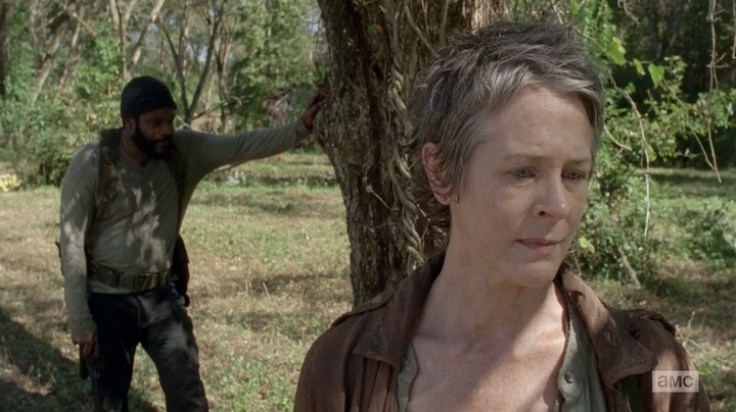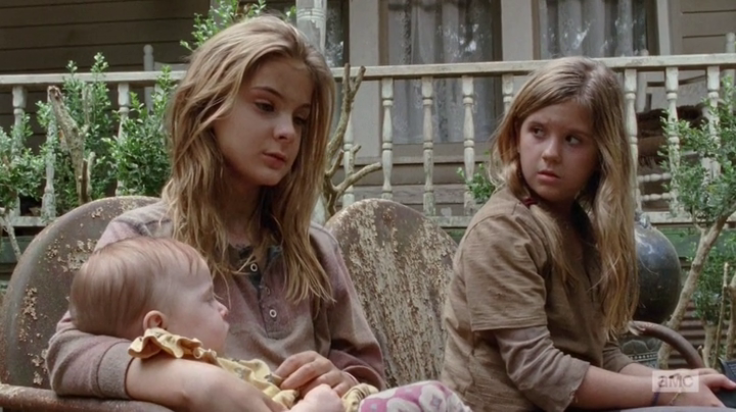The Walking Dead Season 4 Episode 14 Review: The Grove

There I was, lamenting over how lifeless The Walking Dead had become in its previous episode, and then it delivers The Grove, one of the darkest and most disturbing hours of television I have seen for some time. Focusing on the 'family' of Carol (Melissa McBride), Tyrese (Chad L. Coleman) and two girls Lizzie (Brighton Sharbino) and Mika (Kyla Kenedy), the episode was a straight morality play about killing and death, as well as a contrast of innocence and experience in the face of the apocalypse.
Carol has been eager to have the children of the camp learn to defend themselves, so that they won't die like her daughter Sophia. But both the children have problems.
"You're little and you're sweet and those are two things that can get you killed."
Lizzie doesn't understand that the zombies are not alive, and is seen in the episodes unsettling opening shot gleefully running away from a walker, claiming that the monster is her friend and they were just playing. From feeding them rats to crying when they are killed, she doesn't understand that what you become after death is not human. It's a dangerous naiveté, but understandable from a child who has probably started to forget what the world was like pre-apocalypse.
Her sister Mika suffers instead from a reluctance to kill, with Carol referring to both her and her deceased daughter Sophia as not having a mean bone in their body. She stubbornly says to Carol that she wouldn't be able to kill someone, even if they wanted to kill her, as killing is wrong. Her simplistic ethical standpoint works in a world that is black and white, but as we have seen the zombie apocalypse has now made it as grey as Carol's curly hair.
"You did right by everyone."
She herself continues to nurse her demons over killing the infected Karen and David back at the prison, and the dramatic irony is laid on thick as Karen's former lover Tyrese, oblivious to this, proposes they live together in the house they find, telling her, "You did right by everyone".
You're little and you're sweet and those are two things that can get you killed.
As in recent episodes with the group of Rick, Carl and Michonne, and Beth with Daryl, they discover an idyllic home and when for a brief moment they taste normality, they debate whether to try and make a life of their surroundings. But in all these cases, the sense of normality is only temporary, and due to tragedy or other circumstances, they realise that they must venture on.
Of Mice and Men
The two children debate whether they are Tom Sawyer or Huckleberry Finn, but end up resembling Lenny and George from Of Mice and Men, and just like the great Steinbeck novel, this tale of two siblings ends in tragedy.
We've witnessed the shocks of Rick killing Shane, or the Governor decapitating Hershel, but Lizzie murdering Mika is the most brutal twist in the show so far because it is from a child seemingly ignorant of what she has done. A tearful Carol then takes Lizzie outside, and like how we saw earlier in the episode, is told to count the flowers to calm down.

We are not shown Lizzie's death, with director Michael E Satrazemis wisely keeping his distance by having the bullet ringing out across the forest, instead leaving the viewer with the emptiness of what has just happened.
It's an incredibly dark turn for the show, but a necessary one. You can't have a horror show without showing death and exploring why the death of someone matters. The quandaries over whether the walkers are 'people' and whether you can be good and survive have been explored before, but through focusing on the previous bit-part roles of children Lizzie and Mika it gave the show fresh impetus and a new perspective.
"I forgive you"
Whilst it is unfair to say they were both expendable, writer and showrunner Scott Gimple saw how they could be used in this standalone episode to represent the inner turmoil of Carol to devastating effect.
Constantly the most interesting character in the show, she received her karma from her utilitarian decision to murder Karen and David in order to save the camp, as she lost the two children she has protected and cared for for so long due to one not understanding what it means to take a life and the other not understanding what it means to survive.
And in amongst the doom and gloom, a ray of light for humanity is provided by her conversation with Tyrese at the end. By the overt symbolism of the incomplete jigsaw puzzle, she reveals it was she who killed Karen and David, handing her gun over to Tyrese to await her punishment. But after everything they've been through, he forgives her, and with the skeletons now out of the closet, the two head off to 'Terminus' together.
It's an episode that might be too bitter for some to swallow, but as this increasingly schizophrenic series alternates between stellar single episodes like this and the more run of the mill offerings of last week, I hope the writers continue to push the boat out and take the show every now and then in to uncharted territory.
© Copyright IBTimes 2024. All rights reserved.






